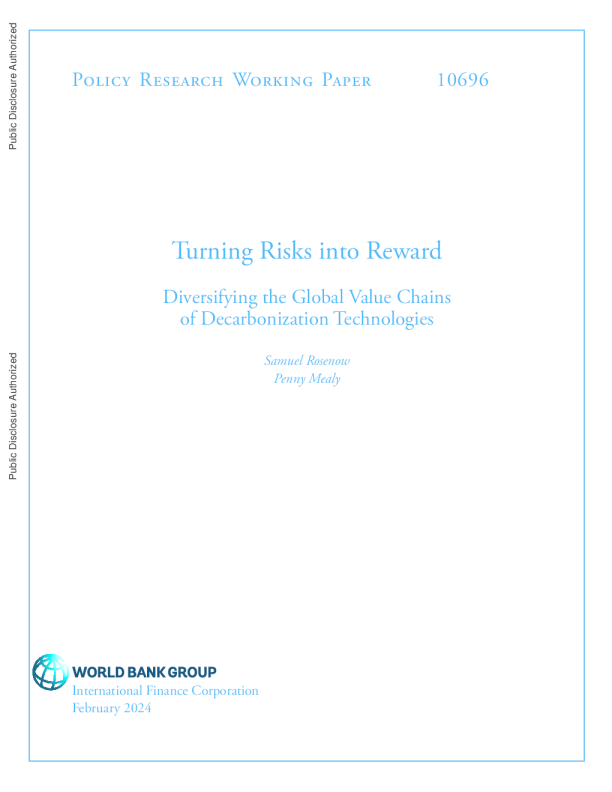2024零售商的气候路线图:规划脱碳价值链之路研究报告
 AI智能总结
AI智能总结
可持续性实践 零售商气候路线图:确定去碳化价值链的路径 大多数零售商平均范围的3级排放是通过产品价值链产生的 。这些价值链可以实现脱碳——但仅通过有针对性的多利益相关者行动。 2024年7月 内容 致谢ii 摘要1 1 零售商的第三排放范围:价值链排放的14 复杂阵列 2 零售商面临的挑战备受关注:在三个价值链中界定19 范围3排放 3近期零售商机遇:在价值链上减少排放32 4催化更广泛的脱碳:零售商的策略与考虑因素40 附录63 致谢 本报告的研究由麦肯锡法兰克福办事处的合伙人PeterSpiller和洛杉矶办事处的合伙人SteveHoffman领导,纽约市办事处的顾问CarolineLing,巴黎办事处的资深客户发展顾问PhilippeDiez,奥斯汀办事处的副合伙人VarunMathur参与;在此过程中,他们得到了KarlMurray、MekalaKrishnan、MiquelFerrer、NehaChatterjee、OlorunyomiJoel和Per-AndersEnkvist的支持——没有他们 ,本报告的完成将不可能实现。 我们同时衷心感谢以下个人和机构,因为他们做出了宝贵的贡献: 姓名组织 ChristopherAdamo达能 潘卡杰·巴蒂亚 世界资源学院 吉姆·安德鲁斯百事公司 本报告独立,反映作者观点,未经任何商业、政府或其他机构的委托或影响。 我们衷心感谢以下个人提供的专业知识、见解和反馈: 姓名组织 凯特·布兰特谷歌 克里斯·卡塞尔劳氏公司(Lowe's) 胡安·费库恩多Etchebehere 达能 斯蒂芬妮·卡夫泰森食品 卡琳·克劳斯家乐福 西蒙·费施韦切尔CDPWorldwide 乔纳森·福利《降碳图》 凯瑟琳·麦克劳克林沃尔玛 安热利克·迪拉拉家乐福 世界资源 贝特朗·斯维德斯基家乐福 阿曼·辛格沃尔玛 亚历山大·弗兰岑学院 托马斯·林加德联合利华 罗纳德·沃尔格韦德沃尔玛 玛丽亚·门迪卢斯我们意味着商业 不适用世界自然基金会 凯瑟琳·皮库斯泰森食品 联盟 基金 伊丽莎白·斯图尔肯环境防御 摘要 随着所有行业的企业努力缩小其碳足迹并实现其去碳化目标,降低范围3排放的路径往往并非直接 。对于某些企业而言,去碳化范围3排放可能更像是在特别错综复杂的迷宫中导航。这种情况在零售业尤为常见。 众多、差异化的价值链,有时高度碎片化,包含多个供应商和投入层级。在这些错综复杂的价值链中产生的排放涉及六个能源和土地利用系统:农业和林业、建筑、工业、交通、电力和废物(展示E1)。 对于普通零售商而言,范围3指标涵盖了其销售的每个SKU在其价值链上产生的上游和下游排放。 网页<2024> <范围3报告> 陈列E1展品《1》中的《12》 范围3排放,根据定义,是指在公司的价值链内产生的间接温室气体(GHG)排放;与范围1和 一家零售商的第三范围指标包括许多行业产生的排放。 总零售行业排放量,百万公 吨(Mt)二氧化碳 全球温室气体排放率,% 7,755 98 7,631 % 运营排放 通常被认为是范围1和2在个别零售披露()零售运营排放 电力使用,制冷,交通,现场燃料) 价值链排放 2.0 零售,范围1和2 28.5 23.6 22.6 ) 14.8 4.9 3.9 废弃物(例如,填埋、焚烧) 构建(例如,建筑、供暖)并且降温) 移动性(例如,重型卡车,)飞机、航运 电力(例如,电力、天然气) 农业和林业(例如,玉米) 通常被认为是第3范围(通常被认为是第3范围 农业、畜牧业(farming,livestockrearing) 个人零售披露1 由他人产生的排放 生产和消费销售的产品通过零售(行业,电力)工厂,消费者电力 住户、农业和林业,构建,移动性) 行业(例如,化工,纺织) 注意:汽油零售未包含在计算中。由于四舍五入,数字可能不完全等于100%。 1总体和行业排放均按区域而非公司层面进行考虑,避免了重复计算。来源:“气候变化”,沃尔玛,更新日期:2023年12月15日;“全球温室气体概述”,美国环境保护署,更新日期:2024年4月11日;“净零转型:成本与收益”,麦肯锡全球研究院,2022年1月;沃尔玛气候转型分析,行星追踪者,2023年11月3日;沃尔玛公司-气候变化2021,CDP披露洞察行动,2021 麦肯锡公司 2气体排放,公司并不直接控制这些排放。因此,减少第3范围排放依赖于所有价值链参与者的参与和努力,包括供应商、分销商和消费者,以及其他公共和私营部门参与者——零售商不能孤立实现这些减排。 这些努力各有不同,零售商在其中的角色也各异 ,从领导并扩大规模,到召集价值链合作伙伴,再到合作并催化,以及倡导并支持减少零售价值链中排放的行动。 他们的第三范围排放的广度和复杂性对零售商在经济、战略、品牌和声誉以及合规性等方面产生了深远的影响。这就是为什么全球零售商都接受了这些挑战中的机遇,追求雄心勃勃的可持续性目标和广泛的举措,这些举措导致了产品价值链排放的实质性减少。他们的努力包括与供应商合作,提高制造和运输中的能源效率,减少浪费,并转向可再生能源。 一些脱碳努力,例如在供应商集中的地理区域将电网转换为可再生能源或清洁能源,是长期努力 ,很大程度上取决于多个公共和私营部门参与者的行动和决策。然而,许多脱碳解决方案在零售价值链利益相关者可触及范围内——且实施时成本中性或节约成本。 在本报告中,围绕七个战略脱碳行动主题进行框架构建。本报告阐述了零售商以及其他价值链利益相关者如何战略性地调配经济资源、自然资源 、物理资源、人力资源、低碳技术和数据透明度 ,以实现减排目标。由于规模、复杂性和关键参与者的原因: 将平均零售商的系统层面3级排放减少15%是可行的,到2030年使用现有技术可以实现;然而,技术和实践的创新有可能实现额外40%或50%的减排。 零售商的第三波排放:一个复杂的供应链排放矩阵 零售商的报告要求在《温室气体协议企业价值链(范围3)核算和报告标准》以及ISO14064中规定 ,这是量化和管理温室气体排放和清除的国际标准系列。在这些标准下,零售商的范围3排放指标涵盖了其整个生命周期内所携带的每件产品从采购、制造、运输、储存、销售和使用过程中产生的所有温室气体。 这意味着对于一个多品类零售商来说,减少第3方排放——这包括约占总排放量98%的零售业排放源——涉及多个部门和行业的参与者,并需要努力实现六种能源和土地利用系统的去碳化。此外 ,大约80%的零售商第3方排放在上游的产品价值链中产生,通过原料生产、材料和零部件、加工和制造以及包装(展示E2)。 网页<2024> <范围3报告> 附录E2展示<2>的<12> 零售商的第三范畴排放反映了在生产方面的广泛差异并且产品渠道内的消费。 总温室气体(GHG)排放,按13个零售渠道细分1% 范围第三范围 第三范围 100%(百万单位)总份额占比 1和2 (上游) (下游) 公吨二氧化碳等效 全球温室气体排放率,% 3 97 汽车零售<12,0745.0 食品零售 消费品必需品商品零售 20 宽领域零售餐馆 家居改善零售 电脑和 电子产品零售 其他专业零售2服装零售 服装,配饰,并且奢侈品 药品零售 家居装饰零售 鞋类 3 74 30 67 2 85 1 79 1 85 400 1.0 81 253 0.6 69 213 0.5 1 14 1 18 29 67 231 70 228 97 30 72 326 2 67 32 1,6494.0 24 1,6294.0 7242.0 5271.0 1850.5 1420.4 830.2 730.2 340.1 注意:由于四舍五入,数字可能不总和为100%。汽车反映下游化石燃料的使用;食品和必需品反映上游的制造和农业。 1本文范围内,“零售”的定义基于全球行业分类系统,包括汽车零售;消费品分销和零售(包括综合性零售、专业零售和家居改善零售);耐用消费品,如服装和奢侈品(包括配饰和鞋类);消费品必需品分销和零售(包括消费品必需品商品零售、药店零售和食品零售);以及餐馆。来源:CDPWorldwide;麦肯锡分析 麦肯锡公司 零售商面临的挑战备受关注:在三个价值链中界定范围3排放 每个零售商的第三范围排放所涉及的数百万产品价值链包含来自全球各地的多个供应商层级和投入。涉及的commodities常常在农业区域或港口混合,价值链中的每一层级都可以非常碎片化。此外,供应商可以在一年内改变其投入来源。这种复杂性使得零售商难以影响供应商如何处理或报告排放。 因此,减少下游产品价值链的排放通常取决于影响消费者行为或当地电力供应所使用的能源源的变化。 在零售商前15种最常销售的产品中,牛肉是零售商第三排放源之一。根据麦肯锡的分析,大约86%的牛肉价值链排放是在上游由动物饲料种植和生产 、化肥生产和牧场养殖产生的。减少反刍动物甲烷排放、转向更有效利用农业投入、最大化生产力和采用再生农业实践,如免耕或低耕土壤和覆盖作物 ,是实现这一价值链减排的关键(展示E3)。 消费者对产品的使用——例如,为电子产品供电或洗涤和烘干衣物——也被纳入了零售商的第三范围排放中。 网页<2024> <范围3报告> 展示E3 展览<4A>的第<12>项 约86%的牛肉价值链的零售商范围三排放是由上游供应商产生的。 4 10 1 10 51 74 86 食物浪费构成 10%范围3下游 排放量在牛肉价值链 3 7 6 13 1 22 10 牛肉价值链排放份额,按特定供应商或零售商的范畴计算,百分比 范围1和2 第三范围(下游)范围3(上游) 3 3 供应商层级 第7级 第六层级 第五等级第四级 三级 二级 一级 示例选手 化肥制造商 作物动物种植者饲料 牛 农民 牛 牧场 肉类 打包机 动物饲料原料生产(种子)种植者,肥料制造商) 动物饲料(例如,牛肉牛 青贮生产 放牧(牛) (种植者,动物饲养者)农民,牛 屠杀与肉类加工 (肉类包装商) 零售商 饲料交易商 牧场交易员 食物浪费 (包括零售)并且消费者亏损(loss) 家庭 种子种子种植者聚合器 交易员 交易员 总牛肉价值链排放量,公吨 (单位)二氧化碳当量/ 4–5 8–10 29–37 33–34 38–52 产品 麦肯锡公司 在电子产品价值链中,减少电力使用碳排放是零售商的主要挑战。平均而言,零售商在电子产品范围3排放中有80%至90%是由此产生。 上游通过高度分散的市场供应商。在该价值链阶段的脱碳很大程度上取决于供应商运营地区可获得的可再生能源(见展品E4)。 网页<2024> <范围3报告> 展示E4展示<5A>的<1 > 超过80%的电子设备价值链排放产生上游,主要由二线供应商及以上企业。 电子设备价值链排放份额按特定供应商、零售商或产品生命周期范围的百分比 从一家零售商的88%的第三级上游排放中:PCBA(印刷电路板组装)=80%,其他 12 6 10 1 11 57 88 82 43 1 94 材料(例如,钢铁、电池、玻璃、镁等)铝、塑料等)=8% 1 平板电脑上游的关键排放热点 由于某种原因,PCBA的排放量达到了约90%。高能耗和依赖化石燃料的生产 半导体在亚洲 范围3(上游) 第三范围(下游)范围1和2 5 原材料 基本材料 电子产品 零售商产品 产品生命周期结束 生产力(例如,矿产开采制、造: 制造业及 使用(能源) 化学品,原油 铸造厂(金属,分销(运输、 消费(consumption) PCBA(印刷电路板组包装装)(、p塑ac料ka(gipnlga)stics) 供应商层级三级 示例铝 二级 金属(例如, 一级 电子产品 零售商 公司 家庭 废弃物 参与者 生产者 工业化学品 铝) 铸造厂 制造商或分销商 公用事业提供商管理 生产者 金属(例如,硅)采矿,熔炼, 精炼公司




